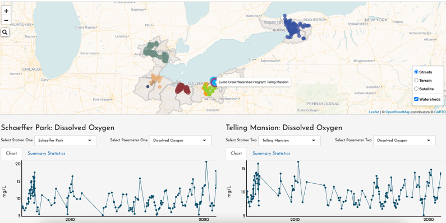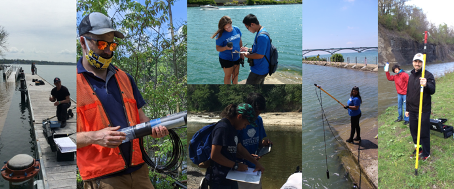By Max Herzog, Cleveland Water Alliance
This is part of the Smart Project Series—stories published by Smart Great Lakes Initiative (SGLi) partners that explore current or future projects that sum up what it means to be “smart,” as established in the Common Strategy for Smart Great Lakes.
The Common Strategy is the key document of the SGLi and will be available for public comment Aug. 23-Sept. 24. Learn more and review the document.

Engagement of community science (volunteer monitoring by community members) represents an important opportunity to expand our regional data collection capacity and address pressing water quality challenges like HABs. Lake Erie residents feel a powerful sense of connection to and responsibility for their water resources and are often willing to contribute their resources and time to that end. Local organizations have been harnessing this energy to monitor water quality in communities across the region for years.
However, these groups have typically developed in response to hyper-local management needs, resulting in a fragmented regional landscape of community science that approaches data collection, management, and use protocols on a watershed-by-watershed basis. Many of them continue to rely on physical data sheets and Excel-based management which severely limit accessibility and discoverability to external end-users. As a result, it is difficult for government, academic, and industry actors to leverage the full scope of Lake Erie’s existing community science movement to address their most pressing research and management needs.

Cleveland Water Alliance (CWA) is working to address these challenges through the Smart Citizen Science Initiative, a regional network of volunteer programs and community funders that support and accelerate community collection of Lake Erie Basin data. This network serves as a platform for driving regional community science innovation including piloting new technologies and implementing collective data standards. The initial three-year (2020-2022) effort is made possible by the support of the Great Lakes One Water (GLOW) Partnership a collaboration of community foundations committed to solving Great Lakes water challenges. To date, the Smart Citizen Science Initiative has engaged twelve volunteer water quality monitoring groups in a series of technology pilots, group visioning sessions, curriculum development projects and other regional collaborations.
Throughout the last year, CWA partnered with The Commons to provide access to their data platform, Water Reporter. With features such as volunteer vs. organizer profiles, built-in QA/QC permissions, and a mobile app for field data upload, the Water Reporter platform is set up to enable organizations to leverage the power of volunteer monitoring to produce meaningful data that are structured and interoperable.
These tools will be backed up by a set of standards for the collection, management, and use of Lake Erie community science data. These Smart Lake Standards will aim to formalize operating procedures and best available technology to provide an accessible framework for elevating the credibility of community science data. The creation of Smart Lake Standards will enable consistent, high quality monitoring of key parameters across the region, enable wider use and comparability of currently available community science data and allow rapid piloting of new data collection technologies against agreed-upon benchmarks.
CWA is currently convening key experts and decision makers spanning academic and federal research institutions as well as State environmental agencies to support this work. These advisors will support CWA and the Smart Citizen Science network in designing and executing the first iteration of these standards by early 2022.
